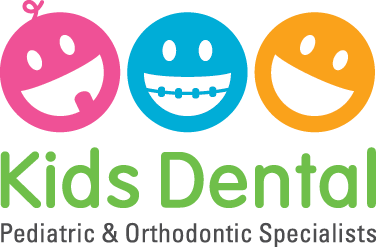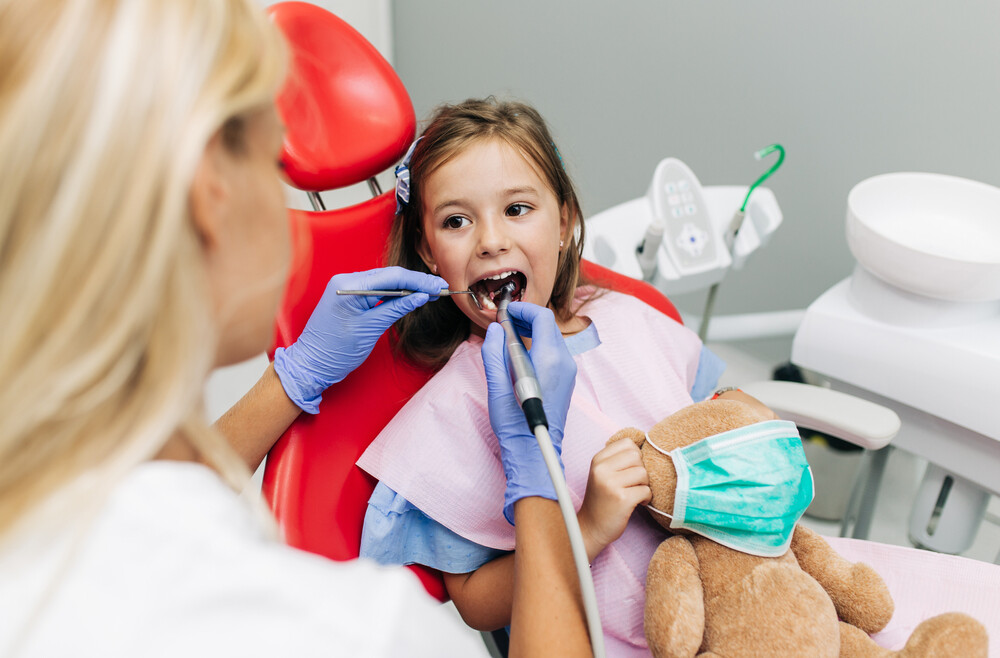Whether your toddler has a mouth full of teeth or only a few poking through, it’s never too early to start thinking about how to keep their smile healthy. Baby teeth may not stick around forever. Typically they change to adult teeth starting at age 6/7 and last ones fall out around age 12/13, so it’s essential to maintain those tiny teeth and gums for the well-being of their future dental health
In this comprehensive guide, we will explore the key indicators and early warning signs that suggest it’s time to take your baby to the dentist.
Let’s dive in.
First Dental Visit: When Should It Happen?
The foundation of good oral health begins early, with the first dental visit. It’s recommended that your baby’s inaugural dental appointment take place around their first birthday. This early visit serves multiple essential purposes:
Familiarization with the Dental Environment:
The first visit introduces your child to the dental office, helping them become accustomed to the sights, sounds, and friendly faces they’ll encounter during subsequent visits.
Early Detection and Prevention:
Dental issues can arise even in the baby’s teeth. Early dental visits allow the dentist to monitor your child’s oral development and identify potential concerns before they become significant problems.
Guidance for Oral Care at Home:
Pediatric dentists provide valuable guidance on establishing proper oral care routines at home, including brushing, flossing, and nutrition.
Early Warning Signs: Watch for These Red Flags
Early Warning Signs To Go To Dentist
While the first dental visit is essential, some situations may necessitate an earlier trip to the dentist. Familiarizing yourself with these early warning signs can help you make informed decisions about your baby’s dental health:
Tooth Discoloration, Spots, or Swelling:
Keep a watchful eye on your baby’s teeth. Unusual discoloration, spots, or unexplained swelling can indicate dental issues that require prompt attention. These signs may suggest tooth decay, even in baby teeth.
Crying and Irritability:
Persistent crying or irritability, especially during feeding, can indicate dental discomfort. Babies should be able to feed without pain or difficulty. If your baby seems uncomfortable during feeding, it’s worth exploring the possibility of dental issues.
Difficulty Chewing or Feeding:
If your baby struggles with chewing, swallowing, or feeding, it may be due to dental problems. These issues can affect their nutrition and overall well-being. A dentist can assess if dental problems are contributing to feeding challenges.
Visible Teeth Problems:
Keep a close eye on your baby’s teeth and gums. Visible problems like bleeding, inflammation, or white spots should not be ignored. These may be early signs of dental concerns, such as gum inflammation or dental infections.
Lack of Tooth Eruption:
When your baby reaches their first birthday, they should typically have several teeth. Delayed tooth eruption can sometimes indicate underlying issues. A dentist can assess whether there are any underlying factors affecting tooth development.
Thumb-Sucking and Pacifier Habits:
While thumb-sucking and pacifier use is common in infants, excessive or prolonged habits can impact dental development. Discuss with a dentist if you have concerns about the effect of these habits on your child’s dental health.
Oral Hygiene Challenges:
Maintaining good oral hygiene in infants is vital. Signs of issues like baby bottle tooth decay, characterized by tooth decay due to sugary liquids, should prompt a dental visit. A dentist can guide you on how to protect your child’s teeth from decay.
Behavioural Changes:
Changes in your baby’s behaviour, such as restlessness or disrupted sleep, could be linked to dental discomfort. Pay attention to any shifts in their demeanour, especially if they coincide with signs of dental issues. A dentist can assess whether dental problems are contributing to behavioural changes.
Conclusion
Regular dental check-ups are not only for adults; they are crucial for babies, too. Scheduling routine visits with a pediatric dentist allows for early detection and prevention of dental issues.
These visits provide an opportunity to monitor your baby’s oral development, address concerns promptly, and establish healthy oral care habits from the very beginning.
In conclusion, your baby’s dental health is a vital aspect of their overall well-being. To learn more about the importance of your baby’s first dental visit and how Kids Dental Group can provide comprehensive care, visit our Baby’s First Dental Visit page.
Together, we can safeguard your baby’s smile and lay the foundation for a lifetime of good oral health.

